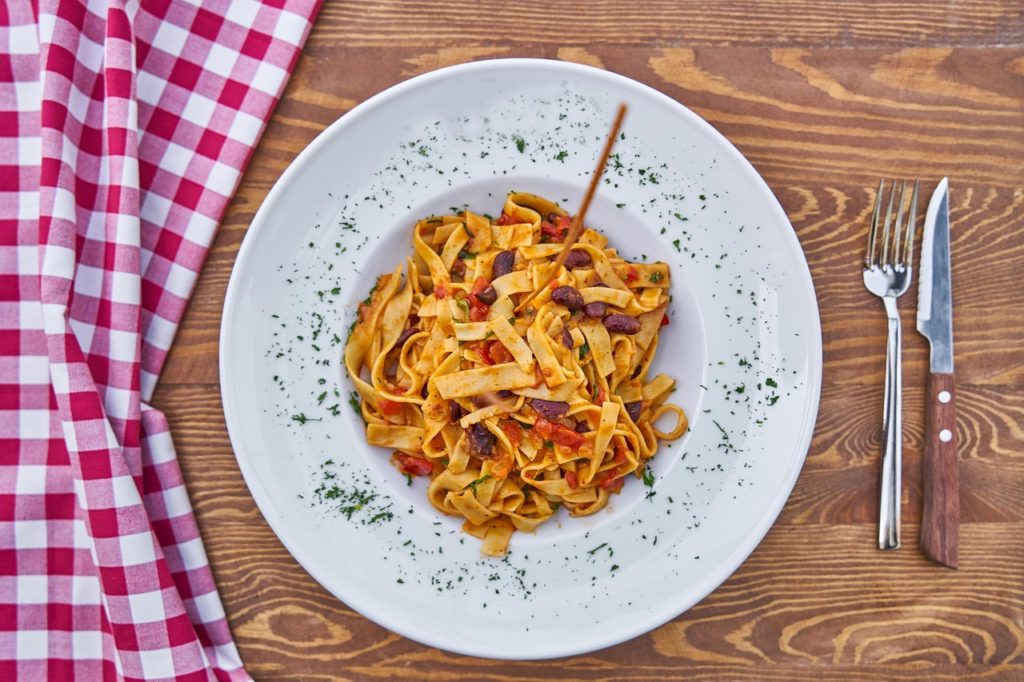In my practice I have people come see me for a myriad of reasons, but I do get asked certain questions by most of my clients. These are questions that almost everybody, regardless of age, weight, or health, tend to have at some point.
For this reason, I thought it might be helpful to give some quick answers to my most frequently asked questions. Not everyone is old enough to remember when David Letterman used to do Top 10 lists on his Late Show, but it was always entertaining. I thought it might be fun to do this late-night style so I will start with the least common question and build our way up. Drum roll please….
10.) What is trans-fat? Why is it bad for me? And how do I know if it is in a product? (I know this is really three questions, but they are all related. Plus, why not start with a trifecta?)
A: Trans-fats are manmade fats. Scientists take an unsaturated fat, then chemically cram extra hydrogens onto it, and voila! They have a fat that is more shelf-stable, which means all those high-fat goodies can sit on a shelf for longer without spoiling. Manufacturers love this because it means they have longer to sell their products. Problem is, our bodies don’t have the pathways to break down and process this artificial fat. That means it just gets dumped into the arteries, because our bodies have no idea how to process it.
These types of fats are usually found in packaged, higher-fat items. Think peanut butters, pie crusts, and other sweets. Manufactures are really good at hiding it, since they actually know how bad it is for people, so they have found lots of tricky ways around labeling laws. That said, you can usually find it on any ingredients list by looking for hydrogenated, or partially hydrogenated oils.
9.) Should I avoid eating anything for at least 2 hours before going to bed?
A: Generally speaking, I’m not really a fan of strict, arbitrary rules regarding nutrition. If it is possible for you to leave at least two hours between eating and bedtime, you will likely sleep better. But that’s not always realistic. For example, some people work late shifts and are hungry when they get home, but they still have to get to sleep right away. Going to bed on an empty stomach isn’t going to help you sleep well either.
If you do get into a position where you find yourself hungry later at night, and know you need to hit the sack soon, I usually recommend avoiding high-carb foods. Instead, focus primarily on foods with protein or fat. Avoiding a lot of carbs before bed will generally allow you to sleep better without having weird dreams.
8.) Is it better if I eat every 2-3 hours?
A: This ties into my response to the last question. No hard rules here, however eating balanced meals more frequently is generally better for your system. The important thing is to eat when you feel hungry and not ignore hunger signals. Most people’s lives are not flexible enough to be getting food that frequently. If you eat a properly balanced meal, it should be able to last you at least 3-4 hours without overwhelming your system. It’s best to not eat large amounts at a time, because that can overwhelm your digestive system. However, let’s be real here. Who really has the time to eat something every 2 hours? I don’t think most people can realistically do that. So, if you need to go a longer period without eating, you can eat a slightly bigger meal. The important thing is not ignoring your body if it is hungry – and by extension, not ignoring your stomach when it’s full.
7.) Is going vegan healthier?
A: Not necessarily. I do not recommend veganism for health reasons; however, I do understand the ethical issues some people have with consuming animal products. Everyone sees life differently, and as a dietitian, it’s not my business to question people’s ethics or values. That said, if you are trying to lose weight or achieve a healthier lifestyle, veganism is not the best option. Why? Because you’ll be denying yourself some critically important nutrients that can only be found in animal products. As always, when it comes nutrition, balanced is almost always better than extreme.
On the other hand, most people consume more animal products than they truly need. Eating vegetarian several days per week isn’t a bad idea, except in some more rare circumstances. So, if eating meat just isn’t for you, consider a vegetarian, rather than a strictly vegan, diet.
6.) Is eating breakfast really that important? Even if I don’t feel hungry in the morning?
A: 100% yes. Breakfast truly is the most important meal of the day. If you skip that meal, you are expecting your body to function with no fuel in your system. Many people don’t feel hungry after waking up, either because they overate the night before, or because they have gone so many years skipping breakfast that their body stopped giving them a hunger signal in the morning. But if you want to manage your weight or simply feel better, eating a healthy breakfast is one of the best – and easiest – places to start!
If eating a morning meal is difficult for you, I recommend starting with liquid calories, like a smoothie, instant breakfast drink, or yogurt. (But NOT coffee! More on that in a moment.) If necessary, start with something small and light. Then, eat more in an hour.
5.) Is coffee okay for me?
A: Coffee in and of itself isn’t inherently bad. People tend to add a lot of fat and sugar that isn’t really beneficial, so at that point it could become a net negative. The biggest issue with coffee is the caffeine. Caffeine is a drug, and an extremely addictive one! From a nutritional standpoint, a caffeine addiction can interfere with your ability to “hear” your own body cues – which in turn makes it easy to gain unintended or unwanted weight. So, if you are trying to manage your weight, it pays to be judicious with caffeine,
Coffee is also NOT – I repeat NOT – a replacement for breakfast. Many people drink coffee and then don’t feel hungry enough to eat breakfast. So, they haven’t given their body any fuel to work with and are in essence slamming on the gas peddle with no gas in the car. This is very damaging to the body, and ultimately has a very negative impact on energy levels. All the people I have worked with that decide to cut out their coffee in the morning, or at least save it until after they have eaten breakfast, come back to report a major increase in energy levels.
4.) Why can’t I seem to resist sugar cravings in the evening? Is this a sign that I lack self-control?
A: Believe it or not, this isn’t a self-control issue, and you didn’t “fall off the wagon.” What most likely happened is that you didn’t eat enough calories earlier in day, either because you were busy, or you were “trying to save your calories for later.” As a result, you created an energy deficit larger than what your body was comfortable with, and it went into what I refer to as “override mode.”
You see, the human body doesn’t respond kindly to being starved, and has built-in mechanisms to prevent starvation. So, if you go too long without eating, or try to deprive yourself, it will backfire on you. I have nicknamed this phenomenon “The Vicious Cycle of Awfulness.” People often skip breakfast, and then don’t eat enough for lunch because they are “trying to be good.” Then, dinner rolls around and they want to eat everything plus the kitchen sink…to be followed up with a sugar binge right before bed. They end up super-full late at night and then can’t sleep well. Then, they wake up the next day and do it all over again. Hence, the Vicious Cycle of Awfulness. They feel tired and deprived all day, then miserably full at night. It results in nothing but awfulness.
Fortunately, there’s an extremely easy fix for this. Eat a proper breakfast, and don’t skip meals/snacks during the day!
3.) Should I try intermittent fasting?
A: Intermittent fasting is all the rage right now. It’s often promoted as a fast, relatively simple way to lose weight, which can be music to your ears if you’ve struggled with reaching your weight goals. But, as a professional, dietitian, I have to be blunt:
Please don’t do it.
I know there are lots of “studies” out there touting all kind of positive benefits and results. But here’s what you MUST understand. It’s not that fasting doesn’t result in weight loss. It’s that the weight loss is rarely – if ever – sustainable.
Remember how I mentioned before that the body doesn’t respond kindly to being starved? Intermittent fasting does not allow you to give your body the proper energy when it needs it. That messes up your system and causes it to be more protective in the long-term. and time again, people have come to see me frustrated that they have “fallen off the wagon” and gained back all the weight they lost from intermittent fasting. But they didn’t fall off the wagon. It’s just that their body did what it’s supposed to do: Protect them from starvation.
In the meantime, intermittent fasting can result in trading short-term results for long-term problems beyond just weight gain. Over the last few years, I’ve worked with many clients who have developed health problems and performance issues. One common denominator? Intermittent fasting. You see, it’s not just starving your body of calories. It’s starving your body of energy…even when your body is begging you not to.
Any type of eating system that encourages you to ignore your own body cues is a bad idea.
2.) What about keto? I tried it, and it worked for a while, but I couldn’t manage to sustain it.
A: Short answer to this is DON’T DO IT!! Again, it’s not that it can’t work short-term, but the reason that it works isn’t because you are in ketosis, but because you are creating a calorie deficit. Ketosis is dangerous! Earlier in my career, when I worked at LDS Hospital, I helped treat many patients who had been hospitalized for ketosis.
The keto diet was originally developed for children with unretractable epilepsy that didn’t respond to any other treatment method. It was so dangerous that they would hospitalize the children for monitoring when they were first put on it. It was not intended for weight management.
If that doesn’t scare you enough, ketones are acidic, which puts the body in an acidic state. Guess what grows really well in an acidic state? Cancer.
As a dietitian, my job is to help people achieve a better life through better nutrition. There are many ways to achieve better nutrition. Keto is not one of them. If you are trying to lose weight, please feel free to come see me. Together, we can find a strategy that is not only more effective, but healthier for you, too.
Can you guess the most commonly asked question I get? By this point, you probably have a clue. Second drum roll please…
- Are carbs bad for me?
A: Carbs (short for carbohydrates) are the subject that people are most confused about. Life is not black and white, and food definitely isn’t. Carbs are what our body uses as its fuel source. The more energy you burn, the more carbs you generally need. If you are primarily getting your carbs from refined sugars, that don’t provide any other helpful vitamins or minerals (think soda, alcohol, or packaged sweets) that isn’t going to benefit you as much as if you had gotten your carbs from whole grains, fruits, vegetables, and other-minimally processed foods.
Does that mean you can never eat your favorite dessert? No. It just means that you should:
- Eat carbs when your body needs the energy, and
- That it is best to get your carbs from less processed sources.
Yes, you can eat bread, and rice, and pasta, and potatoes, and fruit, and all the foods you really like. Just try to have more whole grains, more whole fruits, and eat them sooner in the day when you body needs the fuel. (Just another reason to never skip breakfast!)
In short, listen to your body. Give it the energy and nutrients it needs. Choose balanced meals over extreme diets. I know it’s not the latest fad. I know it’s not “sexy.” It’s something better.
It’s healthy.
And best of all, it works!
***
Okay, so I’m sure this wasn’t as funny as David Letterman’s top 10, but hopefully you found at least one of these answers useful to you. If you still don’t feel like you got your question answered, or have questions about something else entirely, I would be happy to meet with you one-on-one. My assistant Barbara is very friendly and happy to help you schedule an appointment. You can also request an appointment yourself directly from my website. Happy eating!



